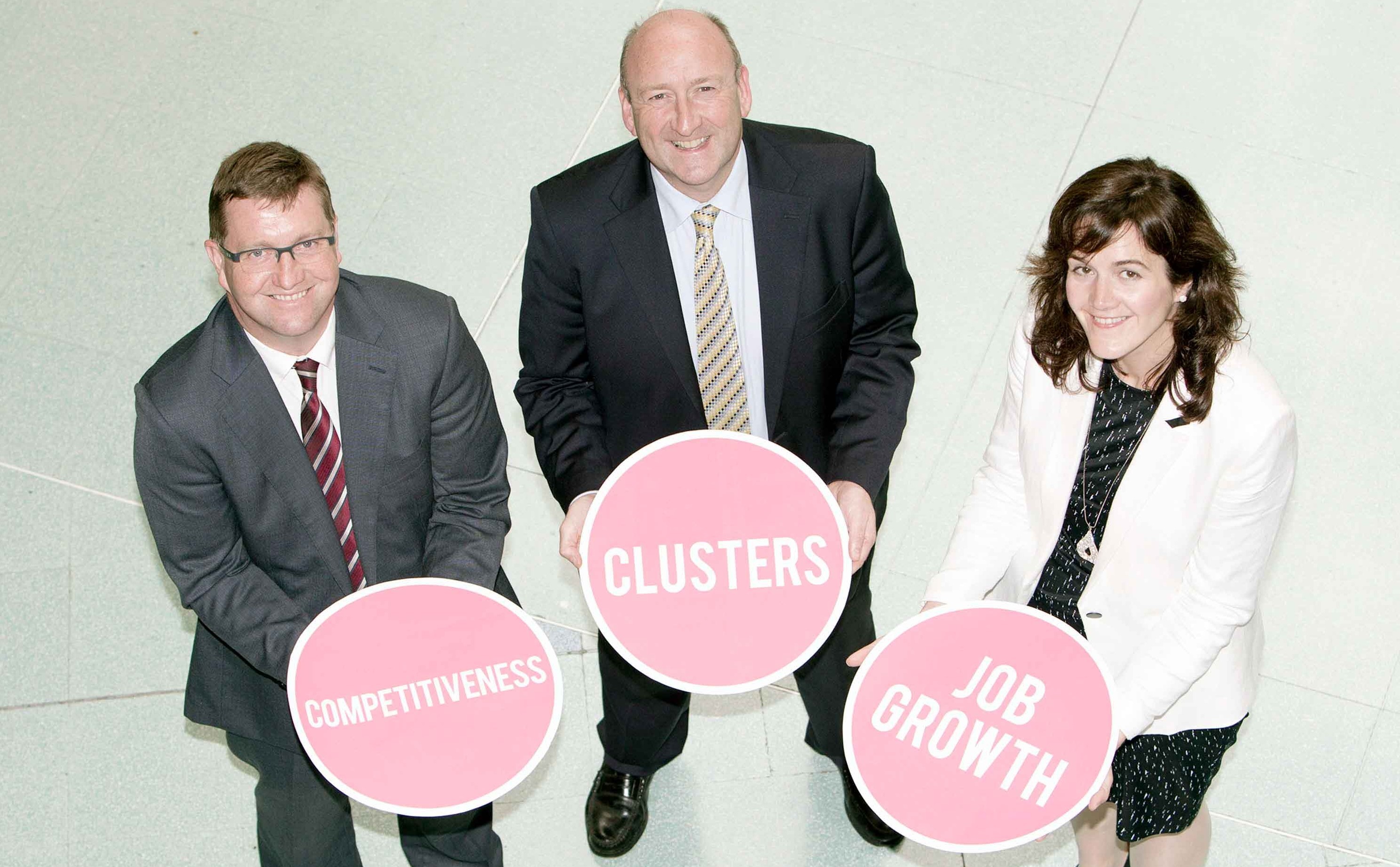

Advert
The National Sports Business Cluster is to be established in Limerick
Pictured: Michael Cantwell, Head of Innovate, Limerick, Dr. Pat Daly, Economic Development and Planning and Agnes Relihan, Cluster Development Executive. Picture: Liam Burke/Press 22.
Ireland’s first ever sports business cluster is to be established with a target of creating 500 jobs within five years. The move was revealed today as it announced that Ireland is to host the leading global clusters conference later this month, the International Cluster Conference.
The National Sports Business Cluster is to be established in Limerick, where 500 people are already employed in sports, and will platform from the elite sporting facilities established at the likes of UL’s sports campus, LIT’s Sportslab (Europe’s leading strength and conditioning centre) in Thurles and a range of companies involved in other sports related activities, from sports tech to nutrition companies, in Limerick and its catchment.
Unveiling plans for the new Limerick cluster, Dr. Pat Daly, Head of Economic Development & Planning at Limerick City and County Council said that establishing formal clusters can help redress economic development imbalances in Ireland by growing employment, not through indigenous companies which benefit most from establishment of formal clusters.
International experience, he said, is that clusters also enhance competitiveness across smart specialisations, enhance innovation, accelerate entrepreneurship and have a positive impact on the growth rate of average wages.
The International Cluster Conference, which will be held at the Strand Hotel, Limerick on September 30th and October 1st and is titled ‘Clusters as Drivers of Competitiveness’, will give key stakeholders, from public and semi-state sector representatives to academics, an understanding of the tangible benefits that formal clusters are delivering globally and what’s required to establish them.
Among the key speakers at the event will be one of the world’s leading authorities on clusters, Dr. Christian Ketels, of Harvard Business School. Other key note speakers over the two-day conference are Professor Dr Philippe Gugler, Chair of Economic and Social Policy and Centre for Competitiveness at the Department of Economics, University of Fribourg, Switzerland; Dr Gerd Meier zu Köcker, Director, Institute for Innovation and Technology, Berlin; Professor Jacques Bersier, Vice-President, Science and Technology Centre, Fribourg, Switzerland; and leading Irish expert Dr Eleanor Doyle, Acting Head, School of Economics & Competitiveness Institute.
Speaking ahead of the conference, which will be held outside Switzerland – one of the world’s leading nations in clusters – Dr. Gugler said that international experience clearly states that Ireland can benefit significantly from formalising clusters.
“There has been quite an amount of research into clusters and their benefits but there is very strong evidence that regions with formal clusters tend to do a lot better than those without established clusters.
“Clusters definitely lead to employment growth, help attract highly-skilled people, result in a high innovation rate, make a region attractive for new enterprises and typically those regions also result in a lot less firms and employment relocating. There is also evidence of a positive impact of clusters on the growth rate of average wages and entrepreneurship, while productivity is also higher,” he said.
According to international best practice, successful clusters require scale – starting out at 20 businesses and typically operating with up to 100 – a full-time CEO and have a radius of up to 90 minutes commute time for member companies.
Among the existing formal clusters in Ireland is the International Aviation Services Centre at Shannon, which comprises a cluster of 40 plus aviation businesses operating in the Shannon Free Zone and has a full-time CEO.
Said Dr. Daly, “Limerick has a proud tradition in sporting circles but that has translated into very real business in the city and region. Today there are around 500 people employed in over 30 sports related companies here, in areas such as sport science, sports tech, sports admin and professional sports and there’s an opportunity to take this to the next level. Establishing a formal cluster will help us achieve that.
“Sport is global. Ireland has demonstrated its ability to attract the ‘Best in Class’ across the ICT, BioTech and Pharma sectors but sport now represents an opportunity to capitalise on the growing demand for sports products and services. While international economic destinations have progressed this approach the international appeal of Ireland for FDI must be harnessed in this niche but buoyant sector.
“The benefits from developing strong formal clusters are seen internationally; in the financial services in London, technology in Silicon Valley, fashion in Milan, etc. For us, it’s not a case of ‘should we’ but we have to. We are starting with the establishment of the National Sports Business Cluster and will also look, in due course, at other clusters suited to this region, such as pharma, financial and agri-tech.”
Among the objectives of the National Sports Business Cluster will be:
- Attracting multinational investment while fostering Micro enterprise and SME industry in sport related business
- Incorporating a sports industry economic strategy in future regional and national economic planning
- Establish areas of specialisation within sport innovation
- Develop a House of Sport site as the national start up centre for sports entrepreneurs
- Create a national and international profile for Limerick as an industrial sport industry hub
- Develop a ‘sport tech lab’ to link 3rd level and industry in specialist research and development areas
Read about Limerick business here















